Check out today's
Fresh Air. A question came up which involved the term,
insurable interest. The question wondered whether the entire meltdown could be attributed to a lack of an insurable interest by those using the Magnetar stategy. I think the guests' answer was that they placed more of the blame on those selling insurance (AIG), than those buying it. The insurers had "whiffed" (seriously underestimated risk) at setting the prices for those wanting to buy insurance for CDOs. If a proper price had been set, then Magnetar couldn't have been using that strategy, at least not profitably. Listen for the big finish of the broadcast, broadway style!
The interview audio is cached here:
1.2.3.Here is my blog entry from last April which has a link back to
This American Life.Update: 2011-05-03I have been meaning to write something about the documentary
Inside Job. It is definitely recommended for anyone who wants to know more about the recent economic meltdown. The facts roll out pretty quickly, and it's a lot to digest in one sitting. It's probably best to take it in in smaller bites. That strategy also helps stop you from getting so mad that you start throwing things and/or breaking up the furniture. Anyway you slice it, the movie doesn't paint a pretty picture of how we got here to this current state of affairs. We were led by the "so called" free marketeers that demanded deregulation. That movement caught its stride in the mid 1990s with deregulation bills signed by Clinton that rolled back some of the major safeguards put in place after the 1930's depression. In this new era, governments all around the world were working hard to outdo one another, by easing banking rules and deregulating complex financial instruments. They were aided by the economists they had in their back pocket (Greenspan, Summers, et. al). At first, Greenspan tried to halt the
irrational exuberance in the market. Eventually, he relented and decided to go along with the
rising tide. With Greenspan on board, no one else of consequence was willing to call the bubble a bubble. Everyone now had been given rose colored glasses. They were working with one main fundamental assumption: the future trend is always positive- prices only go up. That assumption works; that is, until it doesn't. Oops! When the trend reversed, even in the slightest degree (as documented by the Propublica reporting), insolvency rapidly entered the picture. The banks were effectively wiped out over night. They went to Congress and to the Fed and asked for super massive bailouts. I have a hard time with this because these "free marketeers"
had convinced me. I'm okay with having a free market, as long as everyone knows the rules are the same for everyone all of the time. Please, note it was the bankers that have turned against the rules of the free market. They did so after looking at their balance sheets. They changed their mind for simple self-preservation. They'd do anything, including reversing course, if it meant avoiding their demise. They
needed the bailouts to survive. It's much like a 6 year old changing the rules in the middle of a boardgame, just because they are losing. We, as the adults in the room, felt bad for them, and were coerced into changing the rules for them. Little did we know that the frequent rule changes are a violation of the fudamental rules of the game, a perversion of how capitalism is supposed to work. The changes allowed the banks to
socialize their losses. They just hope we will forget that they were all too happy to ride the wave at the other end of the spectrum; that is, they were definitely in favor of
privatizing their profits when times were good. Now, it's just too bad, since we didn't hold their feet to the fire when we had the chance. I have to wonder, where was the public outcry that should've demanded that deregulation (as adopted) be enforced. Those rules demanded that everyone else must "stay out" and the game be played to its conclusion. Fairness demands that the rules be the same in both
good times and in
bad times. The system as it is now is a far cry from Adam Smith's
invisible hand. It's more like a
giant visible hand that jumps in at the last minute to prop up losers that should've been written off much earlier. Again, too bad for us. Good luck paying off the multi-trillion dollar debts!
An interesting part of the movie is the interviews with economists who led the charge for deregulation. Most have now retreated back to academia, and without exception, they have all
landed on their feet. Still, these "great minds" don't come across as particularly intelligent. Two extremely dopey examples still stand out in mind, and even after several months have gone by since seeing the movie: Martin Feldstein (Harvard) and Glenn Hubbard (Columbia). As dumb as they come across, it's amazing that they can be hired anywhere, let alone those prestigious universities. To add insult to injury, wikipedia claims Feldstein is still a perennial candidate for the Nobel prize. Simply amazing! Another irony is that of those interviewed, Elliot Spitzer comes across as one of the most sane voices in the room.
This movie won the Oscar for best documentary of the year. In my opinion, it could have been
the best movie of last year. It is the best of those that I have managed to see so far.
Note: There were a few textual changes in today's post. It took a few tries to get what I wanted to say in the proper syntax.
 spoke-wheel graphic showing the space used by the modules of the two most recently compiled kernels.
spoke-wheel graphic showing the space used by the modules of the two most recently compiled kernels. composite screenshot.
composite screenshot.


 .
. misc. slashdot
misc. slashdot
 .
. .
. .
. .
. .
.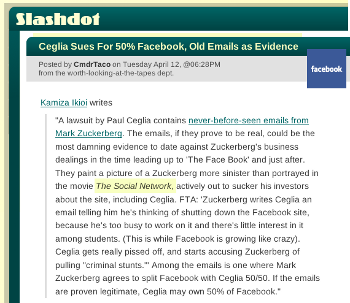 .
.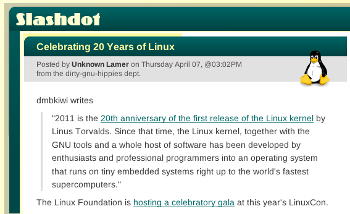 headline.
headline.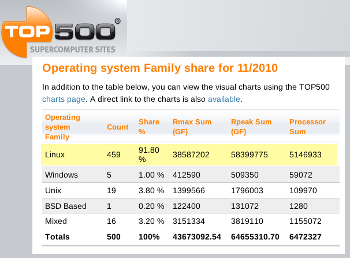 tabulation.
tabulation.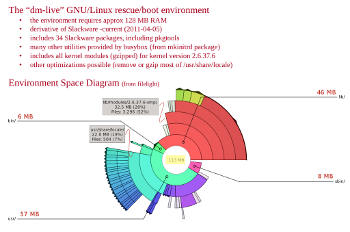 .
. headline.
headline. cell phone pic
cell phone pic cell phone pic
cell phone pic .
. .
.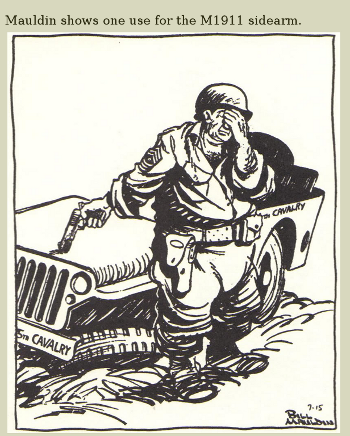 .
. .
.